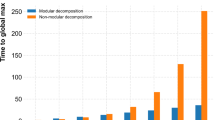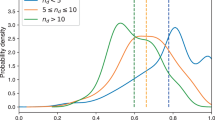Abstract
In interdisciplinary research scientists have to share and integrate knowledge between people and across disciplinary boundaries. An important issue for philosophy of science is to understand how scientists who work in these kinds of environments exchange knowledge and develop new concepts and theories across diverging fields. There is a substantial literature within social epistemology that discusses the social aspects of scientific knowledge, but so far few attempts have been made to apply these resources to the analysis of interdisciplinary science. Further, much of the existing work either ignores the issue of differences in background knowledge, or it focuses explicitly on conflicting background knowledge. In this paper we provide an analysis of the interplay between epistemic dependence between individual experts with different areas of expertise. We analyze the cooperative activity they engage in when participating in interdisciplinary research in a group, and we compare our findings with those of other studies in interdisciplinary research.
Similar content being viewed by others
References
Andersen H. (2010) Joint acceptance and scientific change: A case study. Episteme 7: 248–265
Bouvier A. (2004) Individual beliefs and collective beliefs in sciences and philosophy: the plural subject and the polyphonic subject accounts: Case studies. Philosophy of the Social Sciences 34: 384–407
Bratman M. E. (1992) Shared cooperative activity. Philosophical Review 101: 327–341
Bratman M. E. (1999) Shared intention. In: Bratman M. E. (eds) Faces of intention: Selected essays on intention and agency. Cambridge University Press, Cambridge, pp 109–129
Bratman M. E. (2009) Modest sociality and the distinctiveness of intention. Philosophical Studies 144: 145–165
Collins H., Evans R., Gorman M. (2006) Trading zones and interactional expertise. Studies in History and Philosophy of Science 38: 657–666
Collins H. M., Evans R. (2002) The third wave of science studies: Studies of expertise and experience. Social Studies of Science 32: 235–296
Darden L., Maull N. (1977) Interfield theories. Philosophy of Science 44: 43–64
Evans R., Collins H. (2010) Interactional expertise and the imitation game. In: Gorman M. E. (eds) Trading zones and interactional expertise: Creating new kinds of collaboration. MIT Press, Cambridge, pp 53–70
Fagan, M. B. (2009). Collaboration, toward an integrative philosophy of scientific practice. PhilSci Archive. Retrieved April 28, 2012 from http://philsci-archive.pitt.edu/4804/.
Fagan M. B. (2010) Is there collective scientific knowledge? Arguments from explanation. Philosophical Quarterly 61: 247–269
Fallis D. (2005) Epistemic value theory and judgment aggregation. Episteme 2: 39–55
Galison P. (1996) Computer simulation and the trading zone. In: Galison P., Stump D. (eds) The disunity of science. Boundaries, contexts, and power. Stanford University Press, Stanford, pp 118–157
Giere R. N. (2007) Distributed cognition without distributed knowledge. Social Epistemology 21: 313–320
Gilbert M. (1987) Modelling collective belief. Synthese 73: 185–204
Gilbert M. (1990) Walking together: A paradigmatic social phenomenon. Midwest Studies in Philosophy XV: 1–14
Gilbert M. (2000) Collective belief and scientific change. In: Gilbert M. (eds) Sociality and responsibility. Rowman & Littlefield, Lanham, pp 37–49
Goldman A. (2004) Group knowledge versus group rationality: Two approaches to social epistemology. Episteme 1: 11–22
Goldman A. I. (2001) Experts: Which ones should you trust?. Philosophy and Phenomenological Research 63: 85–110
Gorman M. E. (2008) Scientific and technological expertise. Journal of Psychology of Science and Technology 1: 23–31
Gorman M. E. (2010) Trading zones and interactional expertise. MIT Press, Cambridge
Hardwig J. (1985) Epistemic dependence. Journal of Philosophy 82: 335–349
Hardwig J. (1988) Evidence, testimony, and the problem of individualism—a response to Schmitt. Social Epistemology 2: 309–321
Hardwig J. (1991) The role of trust in knowledge. Journal of Philosophy 88: 693–708
Kusch M. (2002) Knowledge by agreement. Oxford University Press, Oxford
List C. (2005) Group knowledge and group rationality: A judgment aggregation perspective. Episteme 2: 25–38
List C., Pettit P. (2002) Aggregating sets of judgments: An impossibilty result. Economics and Philosophy 18: 89–110
Maienschein J. (1993) Why collaborate?. Journal of the History of Biology 26: 167–183
Nersessian N. J., Patton C. (2009) Model-based reasoning in interdisciplinary engineering. In: Meijers A. (eds) Handbook of the philosophy of technology and engineering sciences. Elsevier, Amsterdam, pp 687–718
Paletz S., Schunn C. D. (2010) A social-cognitive framework of multidisciplinary team innovation. Topics in Cognitive Science 2: 73–95
Petrie H. G. (1976) Do lee? The epistemology of interdisciplinary inquiry. Educational Researcher 5: 9–15
Pettit P. (2003) Groups with minds of their own. In: Schmitt F. F. (eds) Socializing metaphysics. The nature of social reality. Rowman & Littlefield, Lanham, pp 167–193
Porter A. L., Roessner J. D., Cohen A. S., Perreault M. (2006) Interdisciplinary research: Meaning, metric and nurture. Research Evaluation 15: 187–195
Resnik D. (1996) Social epistemology and the ethics of research. Studies in History and Philosophy of Biological and Biomedical Sciences 27: 565–586
Rolin K. (2008) Science as collective knowledge. Cognitive Systems Research 9: 115–124
Rolin K. (2010) Group justification in science. Episteme 7: 215–231
Rossini F. A., Porter A. L. (1979) Frameworks for integrating interdisciplinary research. Research Policy 8: 70–79
Seeman A. (2007) Joint attention, collective knowledge, and the “we” perspective. Social Epistemology 21: 217–230
Staley K. W. (2007) Evidential collaborations: Epistemic and pragmatic considerations in “group belief”. Social Epistemology 21: 321–335
Staley K. W. (2010) Evidence and Justification in groups with conflicting background beliefs. Episteme 7: 232–247
Thagard P. (1997) Collaborative knowledge. Nous 31: 242–261
Wray K. B. (2001) Collective belief and acceptance. Synthese 129: 319–333
Wray K. B. (2002) The epistemic significance of collaborative research. Philosophy of Science 69: 150–168
Wray K. B. (2007) Who has scientific knowledge. Social Epistemology 21: 337–347
Author information
Authors and Affiliations
Corresponding author
Rights and permissions
About this article
Cite this article
Andersen, H., Wagenknecht, S. Epistemic dependence in interdisciplinary groups. Synthese 190, 1881–1898 (2013). https://doi.org/10.1007/s11229-012-0172-1
Received:
Accepted:
Published:
Issue Date:
DOI: https://doi.org/10.1007/s11229-012-0172-1




